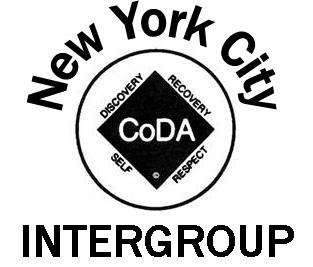 |
A Twelve Step self-help program for Co-Dependents |
| Click on a Step below to see the readings and exercises for that Step. Step 1 Step 2 Step 3 Step 4 Step 5 Step 6 Step 7 Step 8 Step 9 Step 10 Step 11 Step 12 |
CoDependents Anonymous (CoDA) in New York City This web site has been provided by NYC CoDA Intergroup Working the 12 Steps of CoDependents Anonymous (CoDA) © 2005 NYC CoDA Intergroup. All rights reserved. The CoDA 12 Steps and 12 Promises are © Co-Dependents Anonymous, Inc. The Twelve Steps and Twelve Traditions have been reprinted and adapted with permission of Alcoholics Anonymous World Services, Inc. Permission to reprint and adapt this material does not mean that AA has reviewed or approved the content of this publication, nor that AA agrees with the views expressed herein. AA is a program of recovery from alcoholism only – use of the Twelve Steps and Twelve Traditions in connection with programs and activities which are patterned after AA, but which address other problems, does not imply otherwise. Step 6 Co-Dependents Anonymous Step 6: “Were entirely ready to have God remove all these defects of character.” Co-Dependents Anonymous Promise 6: “I learn to see myself as equal to others. My new and renewed relationships are all with equal partners.” Suggested Reading CoDA Blue Book pp. 50-53. 12 Step Handbook: Step 6 Chapter, pages 27-30. “CoDA 12 Steps & 12 Traditions Workbook – Steps 4,5,6” : Step 6 is pages 29-30. CoDA “Making Choices” Booklet, which was written especially for those working Steps 6 and 7. Exercises These exercises can help you work the 6th Step. In other words, they allow you to get into the feelings and specifics and not just rush through the Step. Keep the task manageable; set safe boundaries for yourself. For example, set aside an amount of time that feels comfortable to you to work the Step on a given night. Keep it simple. Consider “book-ending” with your Step work. Book-ending means telling someone, or your meeting, that you plan to do something, then telling them afterwards that you did it. It can help you show up for yourself. Finally, be gentle, and remember that reading and writing about a Step are an important part of working the Steps. 1. Without editing or over-analyzing, write about “what the 6th Step means to me.” 2. Review the questions on page 30 of the “CoDA 12 Steps & 12 Traditions Workbook – Steps 4,5,6” . Use any that feel right. 3. Why is the 6th Step necessary? Why are Steps 6 and 7 separate Steps, instead of just being one Step? 4. What is my role in this Step, and what is God’s? 5. What does “character defects” mean to me? If I’m uncomfortable with the phrase, why? Is there another way of phrasing it that I prefer? What words do the 5th and 7th Steps use to refer to character defects? 6. Exercise – write out a list of your character defects. Use your 4th Step as a reference. Take your time with this. Keep it simple: summarize each defect with one or two words if possible. For example, you might list perfectionism, controlling, self-neglect, and judging. Start with the ones that come up most often for you. Refer to this list as you work the 6th Step. 7. How will I become “entirely ready”? Can I imagine some process that I’d like to try? What tools of recovery can I use? 8. Who in my life today do I resent? How does this feel? Is it serene? What do I gain by resenting? Take this question seriously: I must get something from it or I wouldn’t do it. So what do I get, what is my reason for continuing to resent? 9. What would my life be like if these resentments were lifted? Imagine one morning waking up and the resentments are just gone. Imagine how that would feel, then write about it. 10. Exercise – for each character defect, write about the following: (a) What do I get from this character defect? In other words, how has it served me (or how have I thought that it served me)? Why do I do it? (b) What would life be like if this character defect were removed? Be specific. Imagine your life without it. Then write about that. Again, allow yourself time. 11. Exercise – look at part (b) of the exercise above, and then start gathering affirmations that re-enforce the life you imagine. Write your own, or find affirmations you like in printed literature, such as the CoDA “Affirmations” & “Making Choices” booklets. (There will be more on this topic on the 7th Step worksheet.) 12. As I approach my Step work, what character defects come up? Am I being perfectionistic in my approach to the Steps, or am I shaming myself for not doing it “well enough” or “fast enough”? Am I ready to have these defects removed? If you want to be on our email list to receive updates on upcoming CoDA events in New York City, please write to anicko2794@yahoo.com For more CoDA info, go to www.codependentsnyc.org or call 646-289-9954 For more information on the program of CoDependents Anonymous, visit the CoDA World Fellowship web site at www.coda.org |